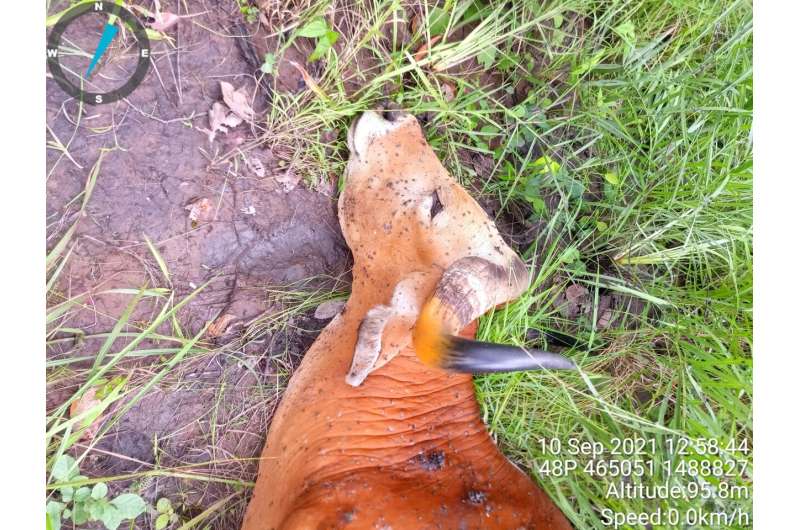This article has been reviewed according to Science X's editorial process and policies. Editors have highlighted the following attributes while ensuring the content's credibility:
fact-checked
trusted source
proofread
Vaccination campaign protects endangered wild cattle from highly contagious potentially fatal skin disease

Scientists from the Wildlife Conservation Society (WCS), the Ministry of Environment, and the Ministry of Agriculture Forestry and Fisheries of the Royal Government of Cambodia have documented the first case of lumpy skin disease (LSD) in wildlife in Cambodia.
The case involved a banteng (Bos javanicus), an endangered wild cattle species, that was discovered by community patrol members from Our Future Organization while on patrol in Phnom Tnout—Phnom Pok Wildlife Sanctuary in September 2021.
It is suspected that the banteng contracted the virus from infected livestock grazing nearby as the virus had already been detected in domestic cattle in the country at that time. To protect free-ranging wild bovids from LSD, a vaccination campaign was launched for domestic cattle ranging within a 20 km radius of protected areas in Mondulkiri and Preah Vihear provinces. WCS and partners published the effort this month in Frontiers in Veterinary Science.
LSD is a highly contagious viral disease that primarily affects domestic cattle and buffalo but can infect wild ruminants. The virus is transmitted through biting insects and contact with infected animals or their bodily fluids. The disease is characterized by the appearance of raised, fluid-filled bumps on the skin, fever, and other symptoms. In severe cases, LSD can be fatal. It does not infect humans.
Through this collaborative effort between veterinarians, wildlife experts, NGOs, and government officials a total of 20,089 domestic cattle and water buffalo have been vaccinated to date around banteng habitat in Cambodia.
"This vaccination campaign serves as an example of protecting both livestock and wildlife health in parallel. Cambodia is conserving wild bovids by taking practical, preventative steps in improving livestock health," said Mr. Daro Sok, the chief of investigation, Surveillance and Control of Animal Disease for the General Directorate of Animal Health and Production.
"This joint effort to provide this vaccination to cattle may have played a crucial role in preventing a larger scale disease outbreak in both domestic and wild cattle, and helped protect community livelihoods and especially to halt public health risks. We thank the Royal Government of Cambodia and our partners for their support in this important effort," said Mr. Seng Teak, Country Director of the World Wildlife Fund for Nature (WWF) Cambodia. Since the launch of the campaign, no further cases of LSD have been reported in wild banteng or in gaur (Bos gaurus), another susceptible wild cattle species.
Although LSD is a serious threat to livestock and livelihoods around the world, data are scarce on the impact on and susceptibility of wild ruminant populations. LSD is one of several diseases emerging as a direct consequence of livestock and agricultural encroachment into wildlife habitat. Targeting prevention measures towards domestic animal hosts, as was carried out around Cambodia's protected areas, is an example of One Health in action to protect biodiversity.
More information: Alice Porco et al, Case report: Lumpy skin disease in an endangered wild banteng (Bos javanicus) and initiation of a vaccination campaign in domestic livestock in Cambodia, Frontiers in Veterinary Science (2023). DOI: 10.3389/fvets.2023.1228505
Provided by Wildlife Conservation Society





















